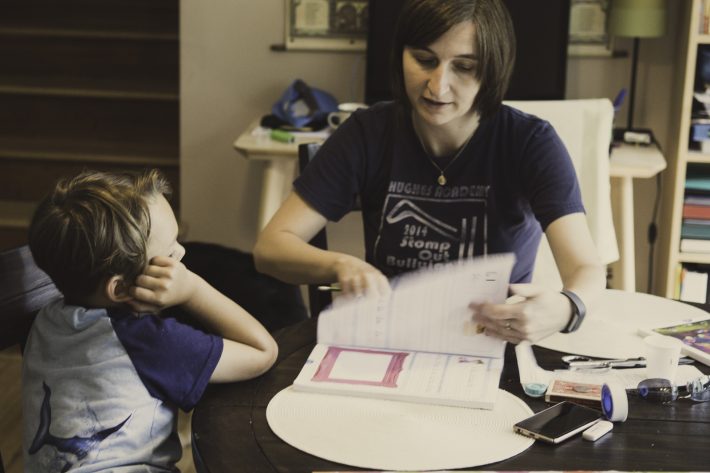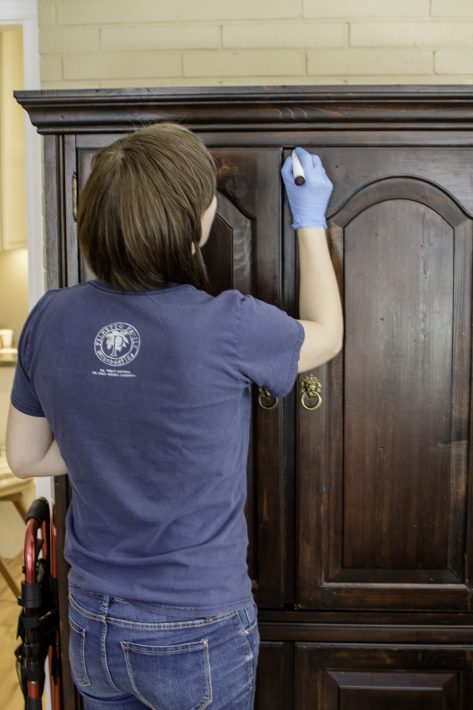Modeling
In education, it’s critical to model. Show, don’t tell.
I teach a creative writing course, which is really “Digital Storytelling,” but that’s not one of the district-provided options for course titles, so I call it “Creative Writing” and do a bit of everything. Right now, students are working on NPR-style audio stories about school events. I thought I’d model it for them. It was kind of fun — perhaps I have a future in radio…
Translations
 A small pot sat on the stove, boiling a bit of chicken for the Boy’s “soup.” We add it to the pureed potatoes, squash, zucchini, and carrot that makes up the bulk of his lunch, and we boil the chicken separately then add it to the blender with the puree. Tonight, K was upstairs, though, and realized the heat under the pot of boiling chicken needed to be turned down, so she told L, “Powiedz tatowi zeby wyciszyl kurczaka.” L, in turn, translated it rather literally and came to me saying, “Daddy, Mama said for you to quiet the chicken.”
A small pot sat on the stove, boiling a bit of chicken for the Boy’s “soup.” We add it to the pureed potatoes, squash, zucchini, and carrot that makes up the bulk of his lunch, and we boil the chicken separately then add it to the blender with the puree. Tonight, K was upstairs, though, and realized the heat under the pot of boiling chicken needed to be turned down, so she told L, “Powiedz tatowi zeby wyciszyl kurczaka.” L, in turn, translated it rather literally and came to me saying, “Daddy, Mama said for you to quiet the chicken.”
It takes a bilingual child to see some of the oddities of language.
Scrabble
We’ve been struggling to get the Girl speaking Polish on a regular basis. She’s resisted consistently until a recent trip to Poland: two weeks with Babcia, including a week with cousin S, and suddenly, she’s speaking Polish spontaneously — to her toys when she’s playing alone.
And so we’ve reached a point at which the Girl can play Polish games, like Scrabble. We play a modified version: a small marker indicates both where to start and what word to spell. We work through hulajnoga (scooter), kot (cat), dom (house/home), and of course mama (mom).
It might be no surprise that the Girl won the majority of the rounds: it’s tempting sometimes to let her win to keep her interest up. (And it’s equally tempting occasionally to arrange a loss or two in order to help her learn how to lose gracefully.) This evening, though, she wins fair and square.
Language
There is something about the process of becoming bilingual that has made me examine language all the more. More than ever before I realized the truth of “The word is not the thing.” Dom and home are two words that mean the same thing, but they are not the same things. They simply prompt in speakers of other languages the same images. Of course the associations will be totally different – for some it means comfort while for others it’s nothing short of pain. It’s just a beautiful thing, language.
My inability to communicate is so very frustrating. I wonder (wander) what gets lost in the translation. I’ve often thought that so much gets lost simply by trying to communicate. Words are so very limiting even when all the words are comprehensible. It’s a wonder that we are able to communicate with anyone – linguistic problems make it a small miracle.
What I Am in Polish
Yet another day in Poland – I’ve been here almost two full months. How quickly it has gone, too. Will two years go so quickly?
The weather was [filled with] its usual strangeness. This morning it was beautiful with rich blue skies and warm sun. The clouds overtook everything and the dull grey to which we all have grown accustomed returned only to be shattered by a fierce wind storm with a bit of rain. So now it’s cold yet again, as one might expect.
(I love the way wet ink glistens in the light. It lends a feeling of authenticity that is lacking on the computer screen.)
I learned today that my name means in every-day Polish “dishes.” So (co?) I will bring to everyone’s minds thoughts of place settings and flatware.
Training Woes
Another tech session, another endurance test. I cannot understand why we do such things. It is such an incredible waste of time – it could be used in so much more effective ways. But of course I really shouldn’t complain. Still, time spent working on lesson plans and/or our syllabi would be much better. This is especially true now that we’re both teacher and learner – we have so much stuff to do that ends up being done at home. So we end up being at school nine hours a day and then we go home and do homework and lesson planning.
One interesting thing about Polish students of English and the future tense: One way to form the future tense is “will” (future tense of by ) plus past tense. So a literal translation will produce “I will went.” They are simply applying a Polish grammatical structure on English, just as we must often do the same in reverse.
An obvious observation: There is not an action which cannot be described in words. The writer’s job is to find those elusive words.
I must teach two lessons tomorrow and though I am hesitant to do it, I am doing a final lesson on past progressive and simple past. I will be using a modified textbook activity which I think will really help to clear up any lingering misunderstandings. I’ll also be doing a lesson on modals.
We had TEFL session today on teaching with music and the final two pieces were Carmina Burana and the second movement to Górecki’s Symphony No. 3. The presenter seemed somewhat impressed that I recognized the pieces and floored when I mentioned that I have four Górecki CDs (I have five but I forgot about one). It was a triumphal moment to name those tunes in class . . .
Perfectly Imperfect
Just when I thought I was getting the hang of this Polish thing, BOOM!! We begin perfective/imperfective [verb forms]. So that means in many cases we have to learn a second verb for the same damn thing. Not only that, but the conjugation patter of many of the past tense perfective verbs are incredibly irregular. Not only is there an ending change from masculine to feminine – the stem sometimes changes! Oh joy.
Sitting in class I experienced total overload. Everything the poor woman was saying simply bounced off of me. I might as well have walked out of the room.
For the first four weeks I’ve been asking for verb conjugation information. “No, not now,” everyone told me, “It’s not time.” So now, in three days, (a week, rather) we’re getting everything. I kept telling people “This is not the first time I’ve tried to learn a foreign language. I know how things work, at least a little.”
One more thing about perfective: Most perfective verbs are simply the imperfective verb with a syllable added. The problem is that because of the next-to-last syllable stressing, adding the extra syllable makes an entirely new pronunciation.
Immersion
I survived another day of immersion with only one day left. That is actually thrilling. Those final sessions are hell, truly. By that time my mind has completely shut down, no questions asked. To try to jump-start it would be a great waste of time. Fortunately, the teachers realize how tired we are (and they are certainly more exhausted) and the final lesson is some sort of game. Of course we don’t have the luxury of completely shutting our minds off. They’re “educational” games.
Spit
I’ve been working with my host mother on the basic Polish sounds and I have hit a real break through in [the] pronunciation of sz and rz. It’s great! Earlier in the evening I was trying to pronounce one of the many “sh” sounds and after several failures I finally threw out a last attempt accompanied by a significant amount of spittle, and she cried “Tak!” with great delight.
I am really finding my place in my host family and I feel quite comfortable here. We joke with one another and seem to enjoy each other’s company.


